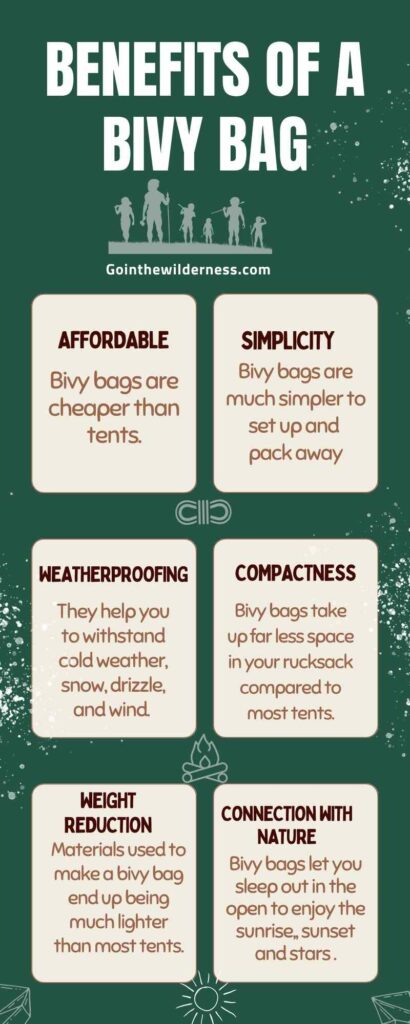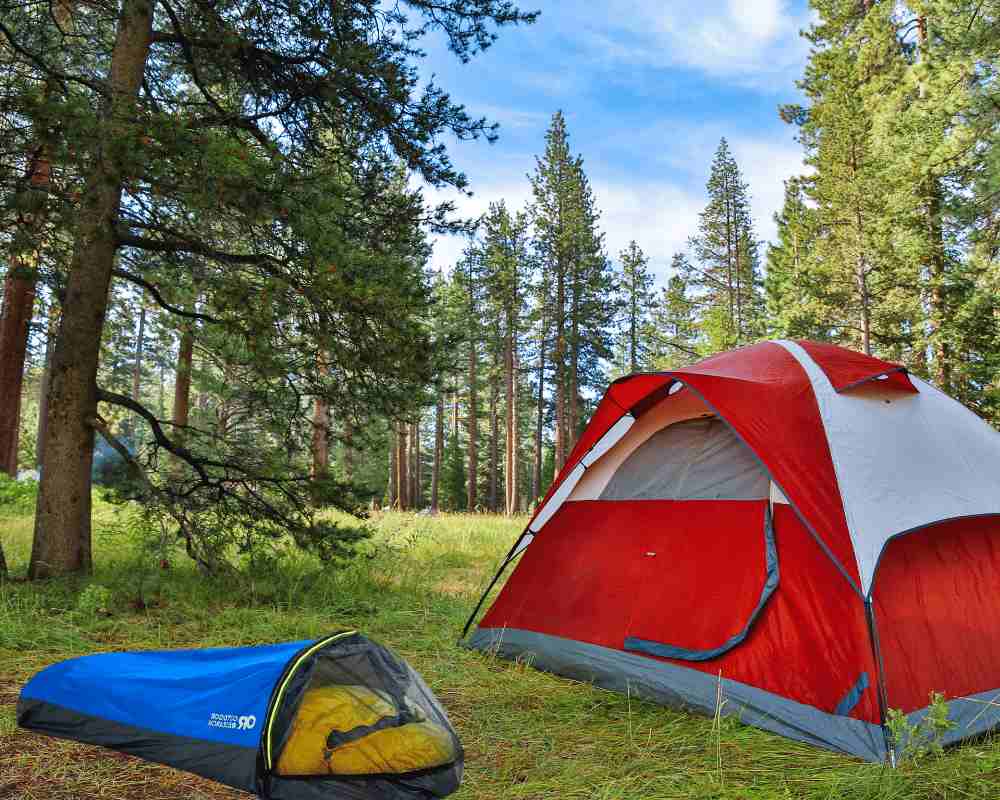Used by hikers, ultra-light backpackers, and bikepackers alike, bivy pages are a simple, lightweight sleeping solution in the wild. No more need for cumbersome tent poles and tarps!
Although bivy bags are simple by design, they’re highly functional and can accompany you in many different climates and activities. The latest, most modern bivy mags have taken that functionality to a whole new level.
In this article, you’ll get to see the benefits of using a bivy bag compared to other camping solutions. All in all, bivy bags make for a uniquely exciting and easy experience. Let’s dive in.
What is a Bivy Bag?
To be used instead of a tent or tarp, a bivy bag is a small, lightweight bag that you can put over your sleeping bag when camping. A bivy bag is usually made out of waterproof materials and is breathable at the top.
Think of a bivy bag as an outer bag made out of a very thin, light, waterproof material. Usually, you’d use it in addition to a sleeping bag and sleeping mat.
The main aims of bivy bags are:
- to offer you more protection than you’d have if using a sleeping bag on its own;
- to act as a replacement for tents and tarps, minimizing the weight of your equipment;
- to allow you to enjoy that feeling of sleeping out in the open, under the stars.
Let’s now delve deeper into the many advantages of using a bivy bag in bushcraft.
Advantages of Using a Bivy Bag in Bushcraft
From their affordability to their in-built weather proofing, bivy bags offer multiple advantages during bushcrafting:
Affordability
In general, bivy bags are cheaper than tents and so can save you money.
Simplicity
Compared to tents, bivy bags are much simpler to set up and pack away. You don’t need to secure poles into the ground and you don’t need to expend much muscle power and energy to set them up. It’s as easy as laying out a sleeping bag!
Out in the wild, speed of setup proves to be a great advantage if it’s getting dark fast or if you need to make a quick departure.
Weatherproofing
Bivy bags are often made out of durable, waterproof, and insulating materials, helping you to withstand cold weather, snow, drizzle, and wind. Having these features built-in means that you don’t need to carry extra, specialized equipment to protect you against the elements.
The best bivy bags can also withstand condensation fairly well and dry up relatively quickly.
Compactness
Bivy bags take up far less space in your rucksack compared to most tents. Once unfolded, they also require less space to set up, meaning it’s quicker and easier for you to find a suitable spot to set up camp. All you need is a flat surface that’s big enough to contain your sleeping bag.
Weight Reduction
The materials used to make a bivy bag end up being much lighter than most tents. For many campers—from hikers to bikepackers—minimizing weight in this way is essential.
Connection With Nature
While a tent keeps you cooped up inside, a bivy bag lets you sleep out in the open. You’re lying on the ground, facing up to the sky. Who wouldn’t want this opportunity to enjoy the three S’s: the sunset, sunrise, and stars?
As well as making you feel closer to nature, a bivy bag protects you against the things you don’t want getting in—like dirt. Done right, bivy bagging is a very fun and pleasant experience.

What Are the Disadvantages of a Bivy Bag?
Despite their many advantages, there are some cons to using a bivy bag. These include:
Privacy
If you’re sleeping in a bivy bag as opposed to a tent, you don’t have a private, enclosed space that you can retreat to. This makes getting dressed in private or having a private shower a little more complicated.
Less Space
Compared to tent camping, some people find that bivy bags make them feel too closed in and cramped. If you don’t like small spaces, you may not enjoy sleeping in a bivy.
Rain Threshold
Although many bivy bags are waterproof, they aren’t the most practical if it is raining heavily. Heavy rain can lead to you getting very wet—and all your gear getting wet if you have no tarp or tent space to pack it away in.
Tip: Before you go camping in a bivy bag, make sure to check the weather forecast and have a contingency plan in place.
Activity Limitations
Similar to the above, camping in a bivy bag is arguably less fun in extreme weather conditions. If it’s very windy, stormy, or rainy, you won’t have a roofed space to retreat into while you’re cooking, reading, relaxing, and more.
Condensation
Bivy bags can handle some fluctuations between humidity and dry air, but the efficacy of their condensation-proofing really depends on the quality of the bag and the materials it’s made of.
Condensation can be manageable at low temperatures—but in winters and extreme temperatures, there may be a huge issue. Everything might stay frozen and if heavy rain falls, you won’t have a good time.
The penultimate section of this article offers tips on how you can minimize condensation in your bivy bag.
How to Choose Between a Tent or a Bivy Bag
There is no straightforward answer as to whether a tent or bivy bag is better. It all depends on your needs—and where you’re willing to make compromises.
If you are looking to downsize, lighten your load, and you’re comfortable being in a small space open to the elements, then the bivy bag is for you.
Meanwhile, if you prioritize space, privacy, and protection against harsh weather, then a tent may be the right option for you.
Tip: If you’re camping for 5-7 days or more, we recommend taking a tent as it is more sustainable when it comes to the weather and having your own space.
A final factor you may need to consider is that bivy bags do require some level of maintenance. It isn’t complicated, however—and it’s totally worth it. Head to the final sections of this article related to preventing condensation and drying a bivy.

Bug Protection in a Bivy Bag
If you’re keen on protecting yourself from bugs, you can buy a bivy bag that has a built-in bug net. The net will protect you from mosquitos, creepy crawlies, and more. If your bivy bag doesn’t have built-in bug protection, you could make yourself a DIY bug net out of netting.
Another handy tip is to spray lots of insect repellent on yourself. Also, don’t forget to keep your space free from garbage and food, which both attract bugs.
Stop Condensation in a Bivy Bag
There are a couple of key things to remember to prevent condensation in your bivy bag:
- Keep wet clothes out.
- Avoid cooking inside, or close to, the bivy bag.
Also, you might want to think about buying a bivy bag that’s specially made to prevent condensation. Some bivy bags offer better protection than others, so do your research to discover the better ones. Usually, the more modern bivy bags are best in this respect.
Finally, always remember to check the weather and plan your trips accordingly. You don’t want to camp in cold weather and end up with frozen condensation in your bivy bag—ouch!
Always remember to carry a thermal blanket for additional protection while you’re out in the wild.
How to Dry a Bivy
Drying your bivy is a key part of maintaining it; look after your bivy bag and you’ll be able to keep using it without issues!
Drying a bivy is as simple as hanging it out to dry. Keep it slightly unzipped during drying so that the inside can dry out, too.
If your bivy bag is wet due to condensation, then shake off the droplets of water or ice chips. Pack your bivy up loosely and put it inside your backpack inside-out. Doing this lets condensation rub off more easily while your bivy bag is stored in your backpack.
…And that’s it. As you’ve learned, bivy bags are a great camping solution for people who want to pack lightweight and sleep under the stars. Bivy bags do have some disadvantages and need a certain level of maintenance—but it’s worth it if you want to enjoy a practical and unique camping experience.
I am Bruno. Navigating the urban rush by day, I find peace under the stars by night. Alongside my loyal companion and co-adventurer Lilith, we explore the balance between city life and nature’s embrace. Through writing and films, I delve into bushcraft and the wild’s allure.
GointheWilderness is my bridge between these two realms, guiding you to reconnect with your innate wilderness.
Eden is here and now; join us in rediscovering it.

